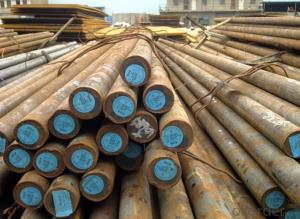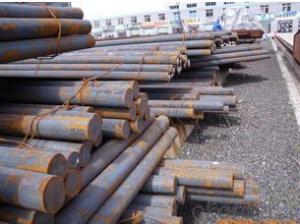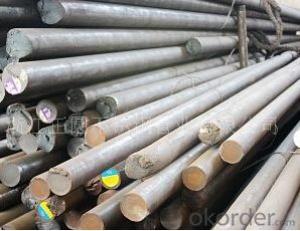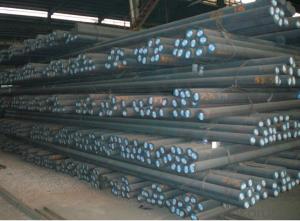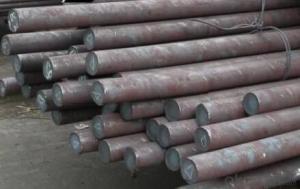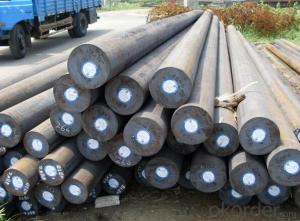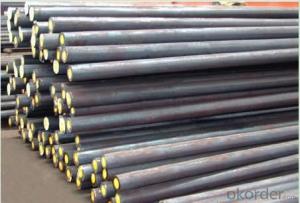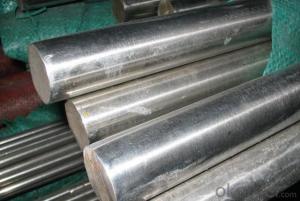Grade ASTM A36 Round Steel Bar Large Quantity in Stock
- Loading Port:
- Tianjin
- Payment Terms:
- TT OR LC
- Min Order Qty:
- 20 m.t.
- Supply Capability:
- 10000 m.t./month
OKorder Service Pledge
OKorder Financial Service
You Might Also Like
Item specifice
High Quality A36 Round Steel Bar Large Quantity in Stock
Specifications of High Quality A36 Round Steel Bar Large Quantity in Stock
1.Competitive price
2.Prime quality
3.Best service
4.Quick deliver time
5 BV ,SGS third party inspection
Description of High Quality A36 Round Steel Bar Large Quantity in Stock
Description | Carbon Steel Rod/Carbon Steel Bar,carbon steel rod,carbon steel shaft,mild steel bar, mild steel shaft,ms bar | |
| Material | ASTM | 1005,1006,1008,1010,1015,1020,1025,1030,1035,1040,1045,1050,1055,1060,1065,1070,1080,1084,1016,1022 |
| DIN | Ck10,Ck15,Ck22,Ck25,Ck30,Ck35, Ck40,Ck45,Ck50, 30Mn4,40Mn4 | |
| BS | 040A04,095M15,045M10,080A40,045M10,080M50 | |
| Standard | GB/T799,ASTM A29,A108,A321,A575,BS970,DIN1652,JIS G4051 | |
| Section shape | Round,square,hexagonal,flat,angle | |
| Surface | Black painted,galvanized | |
| Specifications | Round bar | Diameter: 4mm~800mm |
| Angle bar | Size: 3mm*20mm*20mm~ 12mm*800mm*800mm | |
| Square bar | Size: 4mm*4mm~100mm*100mm | |
| Flat bar | Thickness: 2mm~100mm | |
| Width:10mm~500mm | ||
| Hexagonal | Size: 4mm~800mm | |
| Length | 2m,4m,5.8m,6m,11.8m,12m or as required. | |
| Trade terms | Payment terms | T/T,L/C,Western Union |
| Price terms | FOB,CIF,CFR,EXW | |
| Package | Bundled,wooden box for export standard package. | |
| Delivery Date | Normally according to the order quantity | |
| Application | Carbon steel rod applies to chemical industry, shipping industry, manufacturing industry,construction,decorate Industry,electric power,pump shafts, sanitary wares,furniture handles,boiler,high temperature resistant,low temperature resistant, corrosion resistant. | |
Company Introduction of High Quality A36 Round Steel Bar Large Quantity in Stock
CNBM International Corporation is the most import and export platform of CNBM group(China National Building Material Group Corporation) ,which is a state-owned enterprise, ranked in 270th of Fortune Global 500 in 2015.
With its advantages, CNBM International are mainly concentrate on Cement, Glass, Iron and Steel, Ceramics industries and devotes herself for supplying high quality series of refractories as well as technical consultancies and logistics solution.
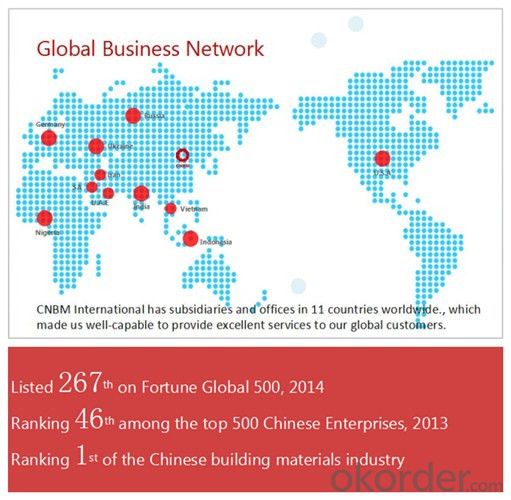
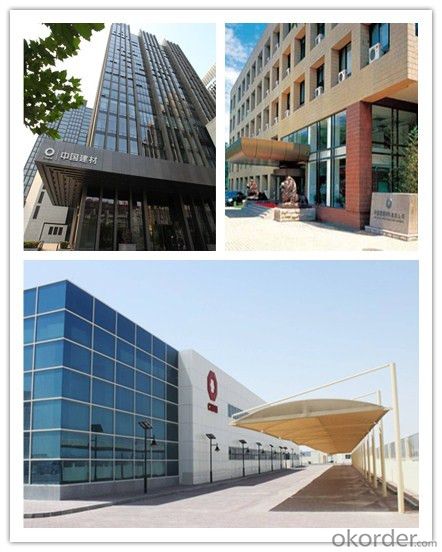
Packaging & Delivery of High Quality A36 Round Steel Bar Large Quantity in Stock
Packaging Detail | Sea worthy packing /as per customer's packing instruction |
Delivery Detail | 15 ~ 40 days after receiving the deposit |
Products Show
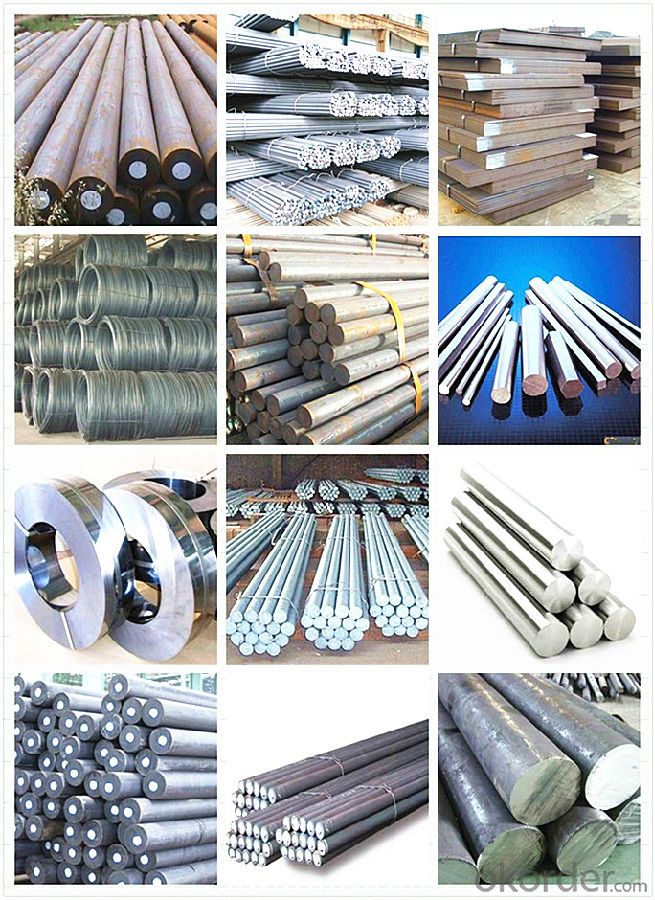
FAQ:
Are you a trading company or manufacturer? | Manufacturer |
What’s the MOQ? | 3 metric ton |
What’s your delivery time? | 15-35 days after downpayment received |
Do you Accept OEM service? | Yes |
what’s your delivery terms? | FOB/CFR/CIF |
What's the Payment Terms? | 30% as deposit,70% before shipment by T/T |
Western Union acceptable for small amount. | |
L/C acceptable for large amount. | |
Scrow ,Paybal,Alipay are also ok | |
Why choose us? | Chose happens because of quality, then price, We can give you both. Additionally, we can also offer professional products inquiry, products knowledge train (for agents), smooth goods delivery, excellent customer solution proposals. |
What's your available port of Shipment? | Main Port, China |
What’s your featured services? | Our service formula: good quality+ good price+ good service=customer's trust
|
Where are your Market? | Covering more than 160 countries in the world |
- Q:How does special steel contribute to the heavy equipment industry?
- Special steel contributes to the heavy equipment industry by offering enhanced strength, durability, and resistance to wear and tear. It enables the production of high-performance components and parts, such as gears, axles, and blades, that can withstand heavy loads, extreme temperatures, and harsh environments. The use of special steel in heavy equipment ensures improved safety, increased productivity, and longer service life, making it a critical material for the industry.
- Q:How does special steel perform in oil and gas applications?
- Due to its outstanding performance and superior properties, special steel is highly sought after and extensively used in oil and gas applications. The exceptional resistance to corrosion exhibited by special steel is crucial in environments where oil and gas are present, as it helps prevent equipment failure and guarantees the longevity and reliability of the components. In addition, special steel possesses remarkable strength and durability, making it capable of withstanding extreme conditions such as high pressure and temperature. This strength enables the steel to endure the demanding and harsh environments often encountered in oil and gas applications. Moreover, special steel retains its mechanical properties even at elevated temperatures, ensuring stability and reliability in these challenging conditions. Another notable advantage of special steel is its excellent weldability. This property allows for easy fabrication and assembly of components, reducing production time and costs. It also ensures the integrity of the structures and equipment used in oil and gas applications. Furthermore, special steel offers exceptional resistance to fatigue and wear, which are commonly encountered issues in oil and gas operations. The ability of special steel to withstand cyclic loading and abrasive conditions guarantees the longevity and reliability of the components, thereby reducing maintenance and replacement costs. Overall, special steel performs exceptionally well in oil and gas applications due to its corrosion resistance, high strength, durability, weldability, and resistance to fatigue and wear. These superior properties make it the preferred choice for critical components, ensuring the efficiency, safety, and reliability of oil and gas operations.
- Q:What are the requirements for special steel used in low-temperature applications?
- Special steel used in low-temperature applications must meet certain requirements to ensure its performance and reliability in such conditions. These requirements primarily revolve around three key factors: toughness, resistance to brittle fracture, and corrosion resistance. Toughness is of utmost importance in low-temperature applications because it determines a material's ability to absorb energy and resist cracking or fracturing. Special steel for low-temperature applications should have high toughness, which is typically achieved through the addition of certain alloying elements such as nickel and manganese. These elements enhance the steel's ability to withstand impact loads and prevent catastrophic failures. Resistance to brittle fracture is another crucial requirement for steel used in low-temperature environments. At low temperatures, steel becomes more susceptible to brittle fracture, which can occur without any significant deformation or warning. To mitigate this risk, special steel for low-temperature applications undergoes specific heat treatment processes to refine its microstructure and improve its resistance to brittle fracture. Corrosion resistance is also an essential requirement for special steel used in low-temperature applications. Low temperatures can often lead to the formation of ice or condensation, which can introduce moisture and potentially corrosive substances to the steel's surface. Therefore, the steel must have excellent corrosion resistance properties to prevent degradation and maintain its structural integrity over time. This is commonly achieved through the addition of corrosion-resistant elements such as chromium and molybdenum. In addition to these primary requirements, other factors such as dimensional stability, weldability, and cost-effectiveness should also be considered when selecting special steel for low-temperature applications. The material should have good dimensional stability to ensure it retains its shape and mechanical properties under varying temperature conditions. It should also be easily weldable to facilitate construction and maintenance processes. Moreover, the selected steel should be cost-effective, balancing its performance with the overall project budget. Overall, special steel used in low-temperature applications must possess high toughness, resistance to brittle fracture, and corrosion resistance. Meeting these requirements ensures the steel's reliability and longevity in challenging low-temperature environments, allowing for safe and efficient operation in various industries such as cryogenic storage, oil and gas exploration, and transportation.
- Q:Can special steel be used in the energy sector?
- Yes, special steel can be used in the energy sector. Special steel, which is engineered and designed to have specific properties like high strength, corrosion resistance, and heat resistance, can be utilized in various applications within the energy sector. It can be used for manufacturing components of power plants, such as turbines, generators, boilers, and heat exchangers, as well as in offshore oil and gas platforms, pipelines, and wind turbines. The unique properties of special steel make it suitable for withstanding the demanding conditions and requirements of the energy sector, ensuring reliability and longevity of these critical infrastructure components.
- Q:Can special steel be used in the telecommunications equipment manufacturing industry?
- Yes, special steel can be used in the telecommunications equipment manufacturing industry. Special steel, known for its exceptional strength, durability, and resistance to corrosion, can be utilized in the production of various telecommunications equipment such as antennas, satellites, transmission towers, and optical fiber cables. Its properties make it ideal for withstanding harsh environmental conditions, ensuring the longevity and reliability of telecommunications infrastructure.
- Q:How does special steel contribute to the wear resistance of products?
- Special steel contributes to the wear resistance of products by offering superior hardness, strength, and durability compared to regular steel. Its unique composition, which may include additional alloying elements like chromium, nickel, or molybdenum, enhances its ability to withstand friction, abrasion, and other forms of wear. This enables products made from special steel to have a longer lifespan and perform effectively in demanding applications, reducing the need for frequent replacements and maintenance.
- Q:What are the properties of wear-resistant alloy steel?
- Wear-resistant alloy steel possesses several key properties, including high hardness, excellent toughness, and superior resistance to abrasion, impact, and wear. It is designed to withstand harsh conditions and maintain its structural integrity even when subjected to repeated friction and contact with hard surfaces. Additionally, these alloys often feature a high level of corrosion resistance, making them suitable for various applications in industries such as mining, construction, and manufacturing.
- Q:What are the different additive manufacturing grades of special steel?
- Special steel for 3D printing processes comes in various grades, each tailored to provide enhanced mechanical properties, improved printability, and increased corrosion resistance. One popular grade is maraging steel, a low-carbon, high-nickel alloy known for its exceptional strength and toughness. It finds extensive use in industries like aerospace and defense, where high-strength components are required. Stainless steel is another commonly used grade in additive manufacturing. It is renowned for its corrosion resistance and ability to maintain strength even at high temperatures. This makes it suitable for applications in automotive, medical, and consumer goods sectors. Tool steel, with its remarkable hardness and wear resistance, is an essential grade for additive manufacturing. It proves ideal for cutting, shaping, and forming materials, making it a go-to choice for molds, dies, and tooling components. Inconel, a superalloy grade, stands out for its high-temperature strength and excellent oxidation resistance. It is widely utilized in the aerospace, automotive, and chemical processing industries. In summary, the various grades of special steel for additive manufacturing offer diverse properties and applications. Continuous development and improvement of these materials aim to meet the ever-growing demands of the industry.
- Q:What are the different methods of coating special steel?
- There are several different methods of coating special steel to enhance its performance and protect it from corrosion or other forms of damage. Some of the commonly used methods include: 1. Galvanizing: This method involves coating the steel with a layer of zinc, either through hot-dip galvanizing or electroplating. The zinc layer provides excellent corrosion resistance and acts as a sacrificial anode, protecting the steel from rusting. 2. Powder coating: In this process, a dry powder is applied electrostatically to the steel surface and then cured under heat. The powder melts and fuses into a protective layer that provides an attractive finish, as well as resistance to chipping, scratching, and corrosion. 3. Electroplating: This method involves immersing the steel in a solution containing a metal ion, such as chromium or nickel, and passing an electric current through it. The metal ions are then deposited onto the steel surface, forming a thin protective layer that improves corrosion resistance and provides a decorative finish. 4. Cladding: Cladding involves bonding a layer of corrosion-resistant material, such as stainless steel or titanium, to the surface of the special steel. This method provides enhanced resistance to corrosion, wear, and heat, while maintaining the strength and mechanical properties of the base steel. 5. Thermal spraying: This method involves heating a coating material, such as zinc or aluminum, to a molten or semi-molten state and then spraying it onto the steel surface using compressed air or a similar method. The sprayed material forms a protective layer that offers excellent corrosion resistance and can also provide other functional properties, such as thermal insulation or electrical conductivity. 6. Chemical conversion coating: This method involves treating the steel surface with a chemical solution that reacts with the surface to form a thin layer of a protective compound, such as phosphate or chromate. The conversion coating provides enhanced corrosion resistance and can also improve the adhesion of subsequent coatings. These are just a few of the many methods available for coating special steel. The choice of method depends on factors such as the desired properties, the intended application, and the budget constraints. It is important to select the most appropriate coating method to ensure the longevity and performance of the special steel.
- Q:What are the applications of special steel in the manufacturing sector?
- Special steel has various applications in the manufacturing sector due to its unique properties. It is commonly used in industries such as automotive, aerospace, construction, and machinery. Special steel's high strength, corrosion resistance, and heat resistance make it ideal for manufacturing components like gears, shafts, bearings, and tools. Additionally, its ability to withstand extreme temperatures and pressures makes it suitable for applications in boilers, turbines, and pressure vessels. Overall, special steel plays a crucial role in enhancing the performance and durability of products in the manufacturing sector.
1. Manufacturer Overview |
|
|---|---|
| Location | |
| Year Established | |
| Annual Output Value | |
| Main Markets | |
| Company Certifications | |
2. Manufacturer Certificates |
|
|---|---|
| a) Certification Name | |
| Range | |
| Reference | |
| Validity Period | |
3. Manufacturer Capability |
|
|---|---|
| a)Trade Capacity | |
| Nearest Port | |
| Export Percentage | |
| No.of Employees in Trade Department | |
| Language Spoken: | |
| b)Factory Information | |
| Factory Size: | |
| No. of Production Lines | |
| Contract Manufacturing | |
| Product Price Range | |
Send your message to us
Grade ASTM A36 Round Steel Bar Large Quantity in Stock
- Loading Port:
- Tianjin
- Payment Terms:
- TT OR LC
- Min Order Qty:
- 20 m.t.
- Supply Capability:
- 10000 m.t./month
OKorder Service Pledge
OKorder Financial Service
Similar products
New products
Hot products
Hot Searches
Related keywords
